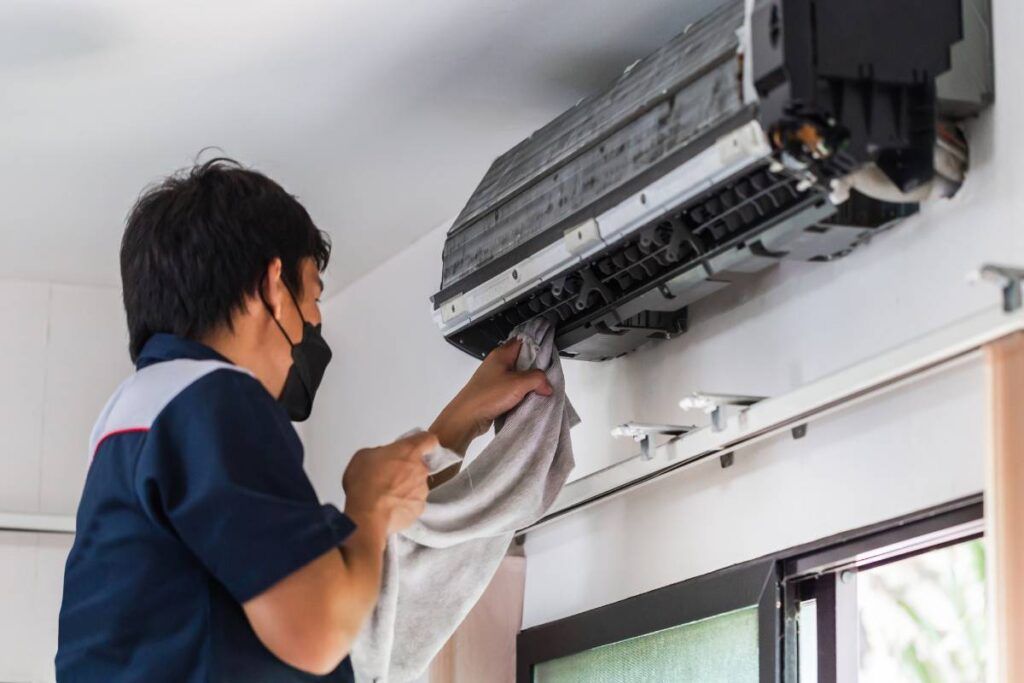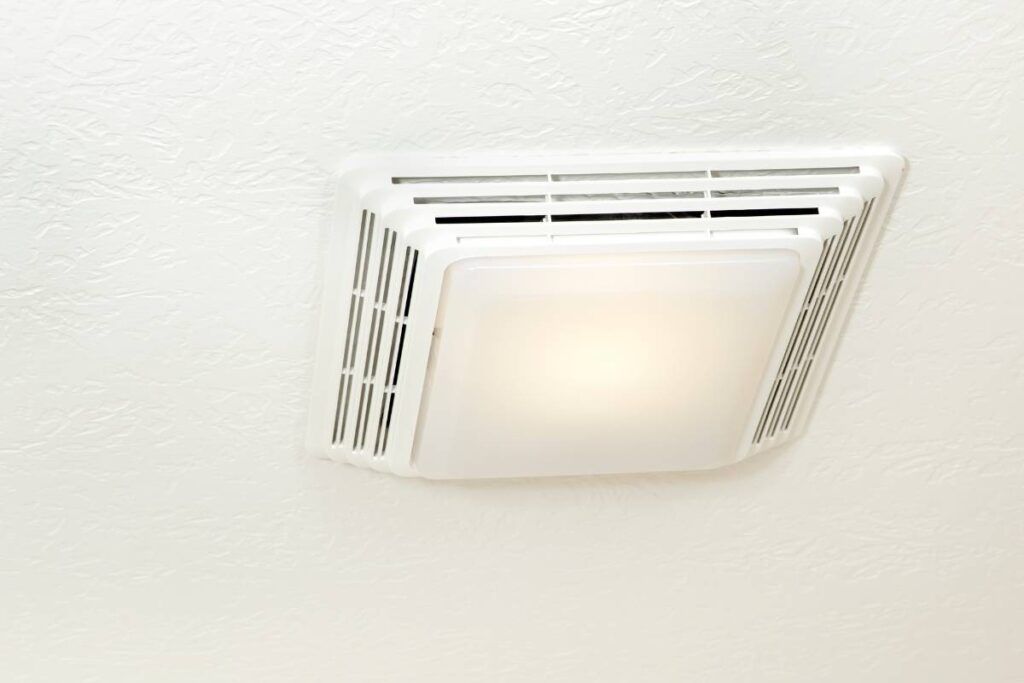Heat pumps are perfect alternatives to heating and cooling systems. They are cheap and environment-friendly. To keep them going for long years, you should clean them from time to time.
To clean the heat pump, disconnect the unit, remove the grilles and clean them with a vacuum cleaner, spray the coils with a cleaning agent to wipe the dirt, clean the registers and ducts with anti-mold cleaning agents, and replace or wash the air filters. Cover the unit back after cleaning.
These are some brief basic instructions about cleaning the heat pumps. Go through this article till the end to gather detailed knowledge about the cleaning and some maintenance suggestions.

Check out our list of top-handpicked products for all your electrical, appliance, and HVAC system needs to keep your home running smoothly.
This post includes some affiliate links.What are the benefits of cleaning a heat pump?
Heat pumps provide warm air in the winter and cold air in the summer.
You might not require separate heating and cooling systems if you have a heat pump.
But for its smooth functioning, you should clean the unit from time to time.
Here are some top benefits of cleaning a heat pump:
Longer lifespan
A heat pump receiving the right maintenance from time to time will have a longer lifespan, at least 15 to 20 years or even more.
Otherwise, it won’t last for even 10 years.
Since the unit works continuously, the internal parts can wear out, and some areas will accumulate dirt, for example, the filters.
The filters filter the absorbed air and trap the dirt particles in the air.
They can get pretty dirty within a few months.
Cleaning the filters will keep your unit in good shape.
But if the unit remains unresolved, it will have reduced service life.
Improved efficiency
The heat pump works continuously and becomes prone to constant wear and tear.
This wear and tear will reduce the efficiency of your unit and provide you with inadequate airflow.
Cleaning the unit from time to time fixes this wear and tear, encourages smooth operations and increases your unit’s efficiency.
Reduces the risk of system breakdown
During the winter, there are chances of unit breakdown because the unit constantly runs to give you the desired temperature.
Proper cleaning, servicing, and maintenance reduce the chances of a breakdown.
During maintenance, the HVAC team will check the components thoroughly and inform you about their condition and which part requires replacement or repair.
Timely repair or replacement will reduce the chances of breakdown and support smooth operation.
Enhanced health and comfort
The heat pump’s performance will also control your health and comfort.
The heat pump releases toxic gas, starts a fire hazard, and short circuits due to damaged components.
Regular cleaning and maintenance can prevent such issues and keep you healthy and comfortable.
How to clean the heat pump?

Cleaning the heat pump means grooming several components, like the filters, coils, heat exchangers, registers and ducts, flame sensors, etc.
Some of the components are fragile and hard to access.
In that case, you should hire an HVAC to clean the unit.
Materials required to clean the heat pump
You should be prepared with the correct materials and tools to clean the unit yourself.
However, you should not approach for cleaning if you have never attempted to clean the unit before.
The list of supplies includes:
- Water hose
- Screwdriver
- Dry clothes
- A vacuum cleaner with a brush
- Mild detergent
- HVAC foaming cleaning agent
- HVAC anti-mold deodorizer
Heat pumps do not need much high maintenance.
If anytime you miss calling the HVAC team for maintenance, following these simple steps should keep your unit in good shape and condition.
Let’s jump into the cleaning process.
Clean the dust from the air filters.
Heat pump filters are one of the easiest steps to cleaning.
Changing or replacing the filters occasionally solves 50% of your unit’s problems.
When the air filters become dirty, the heat pump struggles to distribute the air throughout the house.
Over time, the unit can overheat and lose its efficiency.
The removal and cleaning of the heat pumps are relatively easy, and you can do it without an expert’s help.

Here are the steps:
- Turn off the unit.
- Remove the front panel to access the filter.
- Please take out the filter and try seeing through it.
- If it looks black or gray, replace it with a new filter.
- If you have a reusable filter, wash it, dry it, and put it back into your unit.
- If the filter takes time to dry, use a soft dry cloth or leave it in a shaded area.
- Reinstall your filter back to the unit. Make sure that the arrow directions remain the same as before.
- Turn on your unit.
Clean the fins and coils.
The heat exchanger consists of condenser coils and fins through which refrigerant liquid flows.
When you remove the air filters, you will see the heat exchanger that looks like a bunch of thin, vertically lined plates.
If the heat exchanger is dirty, you need to clean them.
In most cases, you will need an HVAC expert to clean the heat exchangers.
But, if you want to do it, try the following methods:
- Use a brush attachment in your vacuum and slowly move the brush up and down the component. Cleaning the thin plates horizontally will damage the fins. So, do it vertically.
- If you use an HVAC foam cleaning agent, spray the fins and coils with it and let it sit for 10 minutes.
- When the agent works to dissolve, use water to remove the debris. If you still find some leftovers, use a dry cloth to remove them gently.
- If you do not have any cleaning spray, you can use mild detergent, soap, and water to clean the fins and coils.
- If you do not have any cloth or brush, use a sprayer for cleaning.
- Let the wet components out to dry air for some time, and then put back your heat pump cover.
A good foaming cleaner for the coils would be Frost King ACF 19 Foam Coil Cleaner, 19 Oz, 19 Ounce.
Avoid using benzene, thinner, or polishing powder to clean the fins.
Avoid exposing the heat exchange to sunlight, heat, or fire.
Clean the indoor unit grilles.

The grilles in the indoor unit will also have dirt accumulation over time.
Turn off your unit and open the outer cover of the unit, the removable grille, and the top grille with the help of a screwdriver.
You can clean the grooves with a gentle vacuum brush or wipe them with a wet cloth for good airflow.
Clean the outdoor unit.
Outdoor units are equally important as indoor units.
The outdoor unit must be free from snow, leaves, weeds, twigs, and other debris.
If these things block the unit, the airflow gets restricted.
Make it a habit of cleaning the surrounding area of the outdoor unit from time to time, especially during the snowy winter and after windy weather.
The outdoor unit will also have fins, and insects can build nests. As a result, the airflow gets blocked.
Use a brush or vacuum cleaner hose attachment to clean the dirt and debris from the fan blades.
Clean the registers and ducts.
Cleaning the ducts and registers is optional during the cleaning routine.
However, you must do it if you smell a musty odor in your house.
Turn off the unit and look for areas with moisture buildup.
Clean the ducts and registers thoroughly with the anti-mold cleaning agent recommended for the HVAC units.
Consider cleaning the condensate pans, too, with the same cleaning agent.
Once you have cleaned everything, deodorize the system with an HVAC air freshener.
A good deodorizer is SimpleAir sc-3200 Duct Fresh Air Freshener, Cleaner, Deodorizer Professional HVAC Home & Automotive Odor Remover, 32 Fl Oz.
For a good anti-mold cleaning agent, try Concrobium 25326 Mold Control Spray, 32 oz.
Clean the heat exchanger block.

If you have a forced-air heat pump, it will have a heat exchanger block that sends conditioned air through the house.
If the exchanger block is unclean, dirt and debris will build up around it.
It will further restrict the airflow, reduce lifespan, and make the unit less efficient.
Use a vacuum cleaner with a hose attachment or brush to clean the heat exchanger block.
Remove all the dirt particles from the fins.
How often should I clean the heat pumps?
The professionals suggest cleaning the heat pumps every 12 weeks or 3 months.
However, you do not need to follow the routine strictly.
Cleaning frequency completely depends on the surrounding atmosphere and usage frequency.
If you live near an industrial area or a region where your heat pumps run more often, your unit will need cleaning more often, like once a month.
On the contrary, if you live in less polluted areas or regions where heat pumps do not require frequent usage, your heat pump will need cleaning every 3 to 4 months.
Cost of cleaning the heat pump

Many people are inexperienced with cleaning and hesitate to do it independently.
Besides, cleaning requires special tools and materials, and only the experts know about them.
If you are one of them, you should always hire a professional to clean your heat pump.
In that case, expect the cost of the cleaning to be around $80 to $300.
You can save this money by doing it yourself.
Consult your local HVAC expert for cleaning guidance and the required tools and materials. Then start with your cleaning.
Be patient and gentle while doing it. Since the heat pump’s components are fragile, they might damage even with a slight roughness and mistake.
How do you maintain the heat pumps?
An important factor in maintaining the heat pump is confirming that it gets proper professional servicing once a year.
Twice a year is the best choice, but once per year is enough if you clean your unit on time.

The annual maintenance and servicing include the following things:
- Checking the filters, electrical wire conditions, and connections.
- Measuring the electrical amps of the unit.
- Checking the blower motor, fan blades, wheel, and motor bearings.
- Ensuring an adequate amount of airflow passage.
- Inspecting the refrigerant levels and inspecting leakage in the tube. In this case, the team will replace the tube.
- Checking the thermostat settings and controls.
- Examining the drainage systems – the drain lines, pans, and traps.
- Checking the condenser unit and coils
- Reanalyzing the ducts and looking for leakage. For leakage, the team will replace the ducts or seal the leaked areas.
Regular servicing is an integral part of your heat pump’s maintenance.
It lengthens your heat pump’s lifespan and ensures smooth functioning throughout the year.
In the meantime, the house owner should clean the unit and its surrounding.
Also check:
- 15 Reasons Your Heat Pump Is Freezing Up (+ Fix)
- 3 Reasons Your Heat Pump Fan Is Not Running (+Fix)
- 8 Reasons Your Heat Pump Is Short Cycling (+Fix)
- 9 Reasons Your Heat Pump Won’t Defrost (+Fix)
- Will Heat Pump Work Below Zero?
- How Often Should A Heat Pump Defrost?
- How To Reset A Heat Pump? (+Tips)
Final thoughts

Cleaning the heat pump from time to time guarantees its long lifespan and efficiency.
With regular cleaning, your heat pump will function smoothly without any issues.
Clean the air filter, the coils, and the indoor grilles with cleaning agents and dry cloths.
Avoid benzene, thinner, or polishing powder.
Keep the surrounding areas of the outdoor unit clean by removing the leaves, twigs, and other debris, especially during the winter and after a windy climate.
Though the registers and ducts do not need regular cleanings like the filters and coils, you may also clean them with anti-mold cleaning agents.
The best time to clean the heat pump is every 8 to 12 weeks.
Even if you clean the unit regularly, you must call a professional HVAC team for regular maintenance and servicing every year for an overall checkup.
How do I get rid of the smell from my heat pump?
A heat pump can release smells indicating poor drainage, mold, gas leaks, or an overheated unit. You should inspect the problem, fix it, and deodorize your unit.
Does spraying water on the heat pump help?
When there is a decrease in the air temperature, the heat pump’s cooling system does not work properly. Misting the devices can increase the unit’s efficiency and effectiveness in the cooling system.

